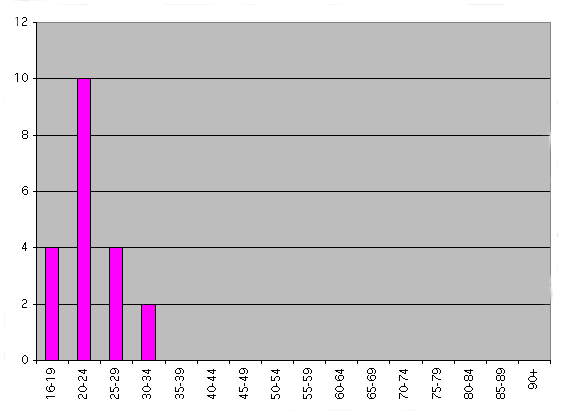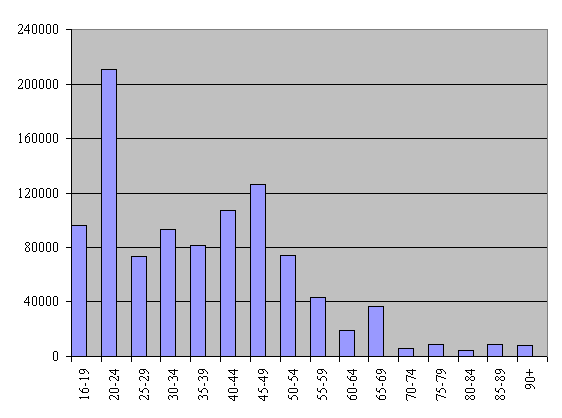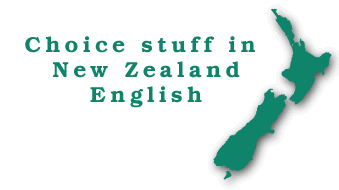![]() Background
Background
I had an impression that the word choice was used in a distinctive way in New Zealand, as in "Choice, man!". I decided to rely upon a number of corpora of English to check on this.
![]() The choice expressions under investigation
The choice expressions under investigation
The focus of this research was the use of the word choice in one
of three ways:
Predicative adjective, referring to a specific person or object. This
usage is illustrated by the example below, taken from the WSC (Wellington
Corpus of Spoken New Zealand English). In this exampe, choice is
the predicative adjective of the sentence it's real choice and
the it refers to a cool leather jacket. [The transcription
makes use of some conventions for transcribing pauses, overlaps etc.,
as described in the manual accompanying WSC.]
| <#DPC254:0905:JR> | so he's got a cool leather jacket |
| <#DPC254:0910:JR> | a real fonzie choice one so i'm going to wear it |
| <#DPC254:0915:JR> | he's going to give it to me |
| <#DPC254:0920:JR> | it's our jacket |
| <#DPC254:0925:VC> | <[>oh my goodness</[></{> <&>9:00</&> |
| <#DPC254:0930:VC> | oh <{><[>yeah</[> |
| <#DPC254:0935:JR> | <[>it's</[></{> real choice |
| <#DPC254:0940:JR> | it's like a real you know <{><[>cool dude fonzie</[> |
| <#DPC254:0945:VC> | <[>yeah you look like fonzie</[></{> <O>laughs</O> |
| <#DPC254:0950:JR> | <?>well</?> and it's real choice <{1><[1>and um</[1> <,> i can't wait to wear it |
| <#DPC254:0955:JR> | it looks really cool man cos i tried it on the other night |
Predicative adjective, referring to a state or event. This usage
is illustrated by the example below, taken from the WSC. In this exampe,
choice is the predicative adjective of the sentence that'll
be choice and the that refers to we're gonna go pruning
give him a hand.
| <#DPC163:1365:TR> | he doesn't like it <{><[>down</[> there eh |
| <#DPC163:1370:AL> | <[>good</[></{> |
| <#DPC163:1375:MM> | he's gonna try <.>and</.> well my brother's starting up a pruning gang and we're gonna go pruning give him a hand <,,> |
| <#DPC163:1380:AL> | yeah |
| <#DPC163:1385:MM> | so that's us |
| <#DPC163:1390:AL> | that'll be choice eh |
| <#DPC163:1395:MM> | mm |
Exclamatory use, as an expression of approval of a state or event.
This usage is illustrated by the example below, taken from the WSC.
In this exampe, choice is an exclamation, expressing delight about
the proposition immediately preceding.
| <#DPC275:0525:FN> | will she be here in time for the fellowship <,> |
| <#DPC275:0530:TI> | oh she arrives at quarter past nine |
| <#DPC275:0535:FN> | oh |
| <#DPC275:0540:TI> | pity <.>i</.> <O>voc</O> if she arrived earlier i would I would've brought her up because <{1><[1><O>voc</O></[1> she's a full on mega <{2><[2>christian for the lord man |
| <#DPC275:0545:TI> | i</[2> thought choice amen i was really happy |
| <#DPC275:0550:FN> | <[1>yeah</[1></{1> |
| <#DPC275:0555:FN> | <[2>that's massive man</[2></{2> |
| <#DPC275:0560:FN> | yeah |
I excluded attributive adjective uses of choice, that is, choice occurring before a noun, as in choice cuts of meat. This is a usage uccurring in most varieties of English and was not a focus in this study.
![]() The corpora
The corpora
I searched the following corpora of English for these three uses of choice:
| LOB | London-Oslo-Bergen Corpus | 1 million words | 1960's |
| FLOB | Freiburg-LOB | 1 million words | 1990's |
| BROWN | Brown Corpus of American English | 1 million words | 1960's |
| FROWN | Freiburg-Brown Corpus of American English | 1 million words | 1990's |
| ACE | Australian Corpus of English | 1 million words | 1980's |
| WC | Wellington Corpus of Written New Zealand English | 1 million words | 1986-1990 |
| KOL | The Kolhapur Corpus of Indian English | 0.9 million words | 1978 |
| LLC | London-Lund Corpus | 0.5 million words | 1950's-1980's |
| COLT | Corpus of London Teenage Language | 0.5 million words | 1993 |
| WSC | Wellington Corpus of Spoken New Zealand English | 1 million words | 1988-1994 |
The procedure involved searching for the form choice and then inspecting each occurrence to check that it belonged to one of the three categories described above.
![]() Results
Results
Here are the results from the searches in the corpora:
| Number of occurrences | |
| LOB | 0 |
| FLOB | 0 |
| BROWN | 0 |
| FROWN | 0 |
| ACE | 0 |
| WC | possibly 1 |
| KOL | 0 |
| LLC | 0 |
| COLT | 0 |
| WSC | 34 |
The one instance from WC involved a quoted phrase "Choice Skull, choice", where Skull is the name of the addressee. Both instances of choice here are examples of the usage I am interested in. Since the second choice is a repetition of the first, I have counted it as just one occurrence.
The uses of choice that I am interested in do not occur in any of the written corpora possibly except as a quote, once, in the WC. Nor do these uses occur in the spoken corpora LLC and COLT. However, these uses occur, strikingly, in the WSC.
![]() Who uses choice this way?
Who uses choice this way?
A total of 22 speakers used choice as a predicative adjective
or exclamation in WSC. Here is a table summarizing the details of each
of these 22 speakers.
| Code | Ethnicity | Gender | Age | Job | Educational qualification |
| TI | SAMOAN | F | 20-24 | STUDENT /CHECKOUT OPERATOR | BURSARY |
| JR | PAKEHA/ ASIAN | M | 20-24 | BURSARY | |
| ME | MAORI | F | 25-29 | SFC | |
| AY | MAORI | M | 25-29 | BA | |
| GW | MAORI/ PAKEHA | M | 25-29 | SENIOR POLICY ADVISOR | B AGRI |
| PF | PAKEHA | F | 30-34 | TEACHER | DIP TCHG, BA |
| AL | ENGLISH | F | 20-24 | STAGE ONE UNIVERSITY | |
| IR | MAORI | M | 30-34 | STUDENT | ADV TRADE ELECTRICAL |
| DL | MAORI | F | 20-24 | STUDENT | |
| HI | PAKEHA | F | 16-19 | PARTIAL BA | |
| MQ | PAKEHA | M | 20-24 | INSURANCE CLERK | SC |
| FN | SAMOAN | F | 20-24 | STUDENT | UE |
| IB | MAORI/ PAKEHA | F | 20-24 | MAORI STUDIES LECTURER | MA (1990) |
| BN | MAORI | M | 25-29 | POLICY ANALYST | BA |
| TR | PAKEHA | F | 16-19 | BURSARY | |
| AA | MAORI/ PAKEHA | M | 16-19 | STUDENT | BURSARY |
| DM | PAKEHA | M | 20-24 | P/T JAPANESE TUTOR | BURSARY |
| GB | PAKEHA | M | 20-24 | MUSICIAN | 7TH FORM CERT |
| LN | PAKEHA | F | 20-24 | BURSARY | |
| JD | PAKEHA | F | 16-19 | HOUSE CLEANING | SFC |
| XX | n.a. | n.a. | n.a. | n.a. | n.a. |
| IJ | PAKEHA | M | 50-54 | DOCUMENTARY PRODUCER | BA |
Choice is fairly evenly distributed between females and males: 11 Females and 9 Males.
Choice is found in many ethnic groups: Maori, Maori/Pakeha, Pakeha, Pakeha/Asian. Samoan, English ethnicities are all represented.
Choice is used by people from various educational backgrounds and types of employment/study.
However, choice does not occur equally in all age groups: 16-19 (4), 20-24 (10), 25-29 (4), 30-34 (2), 50-54 (1), unknown, but part of a conversation with 20-24 year olds, and presumably the same age (1).
The 50-54 year old male IJ stands out, as the only speaker identified over 34. In fact, IJ's use of choice does not have the same semantic and pragmatic effect of the other examples. Here is part of the conversation in which IJ used choice:
| <#DGI098:0260:PW> | he was hitting the bullocks and i flew across the paddock and jumped up and <&>21:00</&> down in front of him and screamed at him and joe's eyes nearly fell out of his <O>laughs</O> head at this small girl and he actually did stop hitting for the moment <latch> |
| <#DGI098:0265:IJ> | <[><O>laughs</O></[></{> |
| <#DGI098:0270:IJ> | mm his his language with the bullocks would have been <.>qu</.> choice too <{><[><unclear>word</unclear></[> |
| <#DGI098:0275:PW> | <[><O>laughs</O></[></{> it was indeed yes well well lively |
This use of choice, referring to language, is familiar in other varieties of English, as a wry way of referring to vulgar or obscene language. It is found, for example, in the British National corpus: rather choice insults, rather choice language, a few choice descriptions etc. This is not the way choice is used by the other 21 speakers.
Figure 1 plots the number ofWSC speakers (Y axis) using choice in a predicative or exclamatory way against age goup (X axis). IJ and the speaker of unknown age have been excluded.

| Figure 1. Number of speakers in WSC using choice by age groups. |
One needs to compare these results with Figure 2. Figure 2 shows the
number of words (Y axis) contributed to the WSC by different age groups
(X axis).

| Figure 2. Number of words in WSC contributed by age groups |
Clearly the 20-24 year old group is over-represented in WSC. Hence, the high number of 20-24 year olds using choice may, to some extent, be a reflection of the skewing of the sampling towards this age group. However, the sampling technique does not explain the occurrence of choice in the 16-19 or 24-29 year olds, but not in the over-35 year olds. It is safe to conclude, therefore, that the use of choice is clearly a feature of under-35 year olds; it is not a feature of over 35 year olds.
Choice, as in "Choice!" "It's really choice" etc., occurs numerous times in the Wellington Corpus of Spoken New Zealand English. This use does not occur in any of the other spoken corpora investigated. Hence, based solely on comparing corpora of spoken English, it is a usage found only in the New Zealand corpora. These results should not be interpreted as a finding about contemporary use of choice in other English-speaking countries. The corpora used for comparison of spoken English were too limited (restricted to British English and smaller number of words) to be an accurate gauge of spoken English in the United Kingdom or anywhere else other than New Zealand.
This use of choice is hardly represented in the Wellington Corpus of Written New Zealand English and does not occur at all in the other comparable written corpora investigated. It is a feature of spoken New Zealand English rather than written New Zealand English.
Choice is used by New Zealanders from various educational backgrounds, various ethnic groups, male and female alike. However, it is clearly a feature of the speech of under-35 year olds, not the over-35 year olds, in the Wellington Corpus of Spoken New Zealand English. The Wellington Corpus of Spoken New Zealand English is dated 1988-1994 and it would be of interest to investigate the use of choice by age groups at the present time to discover the extent to which it is still restricted/preferred to under-35 year olds
*I thank Robert Sigley for comments on an earlier version of this page. JN
![]() Responses to this research
Responses to this research
Regarding your page, I'd like to bring to your attention the possibility that the NZ use of the term choice as you have described was common slang in America during the 1960's. I grew up in the 60's in America and distinctly recall hearing usage that you seem to be describing. That is, choice unattached to a noun.It is now a lower frequency expression.
I refer you to http://cougartown.com/slang.html
The term may have arisen from a stamp that US department of agriculture meat inspectors would use on beef. Anything passing would be stamped "CHOICE USDA". The humor was that the thing being complimented was also being compared to a piece of meat.John Messerly, john_messerly@hotmail.com, 6 Feb 2002
I read your research on the above topic with interest. I thought you might be interested in a personal perspective from a Native kiwi speaker (European NZ, university education). I first encountered choice as in "it was choice, man", when I moved from Hamilton to Auckland to study at university in 1982. My social group were not snobs, but the use of the word was considered vulgar and ignorant (although educated NZers of my generation will say fuck with gay abandon). I was stunned when I returned to Auckland university to teach in 1993. All my students used the word.in about 1997, I noticed the British chef Jamie Oliver,using it in the kiwi way.Oliver had spent some time in NZ, and unlike his counterpart, Gordon Ramsay, enjoyed the experience.Anton Ansford, 17 June 2003
I wondered if you were aware that the use of choice as a predicative adjective was common in Australia when I was in high school in the late 1970s and early 1980s. I'm a native speaker of Australian English who grew up in the western suburbs of Sydney.
You can find out more about the use of choice in Australian English at the following website:
Search the Word Map database for choice, and a few comments will appear.Adam Schembri, adam.schembri@bigpond.com, 18 March 2005
The initial information on this page
was provided on 19 December 2001.
The author of this page is:
John Newman
Department of Linguistics
Faculty of Arts
University of Alberta
Edmonton AB, T6G 2E7
Canada
john.newman@ualberta.ca
